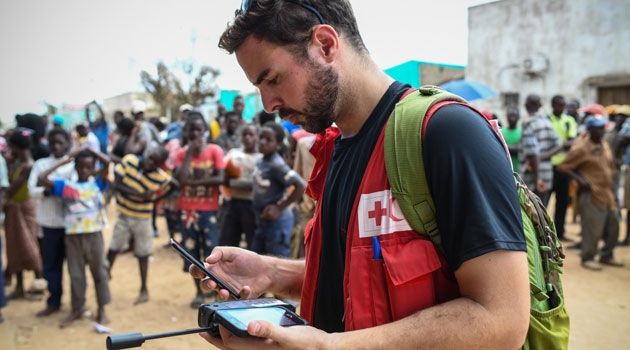Lessons from the Ebola disaster can be applied to COVID-19
How can we build trust in the community in the midst of a crisis, such as the Ebola disaster in the Democratic Republic of Congo? And can it be related to the work of fighting COVID-19? That is the theme of Jamie LeSueur’s lecture on 11 March, in connection with the Alumnus of the Year ceremony.
Photo: Corrie Butler/IFRC
Jamie LeSueur is the global Head of Emergency Operations at the International Federation of Red Cross and Red Crescent Societies (IFRC).
In October 2020, he was named Alumnus of the Year at Uppsala University and on 11 March, a digital ceremony will be held, with a lecture by Jamie LeSueur. He is currently on assignment in Addis Ababa, Ethiopia, but expects to be able to hold the lecture live.
What will you talk about in your lecture?
– I will try to take the audience to the eastern regions of the Democratic Republic of Congo, where I led the IFRC’s response to Ebola three times over the course of two years. The outbreak was the second largest in history. It’s a bit of a personal story about what it takes to manage such a big operation, about community trust and the essence of public health responses, through the eyes of the volunteers and the community members.
– Also, it’s going to be a strong link to COVID-19, because many of the lessons that we learned from Ebola on building community trust, engaging the community on their terms and being accountable on their needs, are directly applicable to how we should be fighting COVID-19. At the end of the day, public health interventions are fought and won in the community.
What are you working with right now?
I’m deployed in Addis Ababa, Ethiopia, to lead the IFRC response to the population movements associated with the crisis in the Tigray region.
Why did you start working with crises and disasters?
– It started a long time ago, when I joined up as a volunteer at the Canadian Red Cross. Ever since, I´ve been volunteering and working in emergency action. While at Uppsala University and through the Rotary Peace Fellowship, I was able to get my first official international mission with the UN Office for the Coordination of Humanitarian Affairs in South Africa, which then paved the way for me to work with the IFRC in emergency contexts across the African continent.
Do you have any special memories from your time as a student in Uppsala?
– Of course, one of the greatest things that I really remember from Uppsala is how beautiful it is in the wintertime and in the autumn. It’s really nice to think back, when you’re in not so nice parts of the world, to every Swedish home having a candle in the window around Christmas time. I just love Swedish culture. I also have great memories from the Department of Peace and Conflict Studies, great friends that lasts for a life time and friends that I´ve met since then around the world.
Did you learn something that has come to particular use?
– There was an impression that the Uppsala program was very theoretical and sitting in the classroom I wondered “Will methods ever be applicable in my life, outside a university context?” But now as an emergency operations manager, one of the first things we do when we hit the ground is a rapid need assessment, using qualitative and quantitative methods that I learnt in Uppsala. All that stuff has been remarkable applicable in disaster zones around the world.
– At the same time, Uppsala University taught me the importance of analysis, which help to create not only really good response programs but also good key messages for the international community to raise awareness of the crises we’re responding to.
Annica Hulth
Alumnus of the Year
- Each year, Uppsala University awards the title of Alumnus of the Year to an alumnus who has made an outstanding contribution to their professional field, or has accomplished something else worthy of honouring.
- The award Alumnus of the Year 2020 was awarded to Jamie LeSueur, Global Head of Emergency Operations for the International Federation of Red Cross and Red Crescent Societies (IFRC).
- The award will be presented on 11 March 2021 in conjunction with a lecture from Jamie LeSueur entitled Humanitarian Emergency Operations: Leadership Lessons from the DR Congo Ebola Response and Other Crises.

